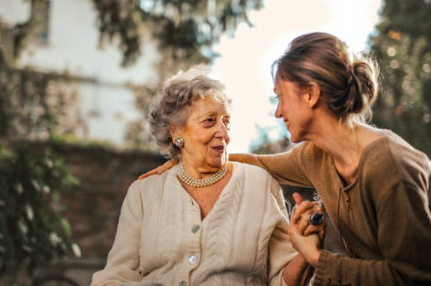Article
Lessons On Life

My mother had lived alone for 7 years after the death of her husband in 1999. In the last decade, due to chronic diseases, she began living with her children in rotation. She also suffered a minor stroke and had to begin regular rehabilitation. My family immigrated overseas in 2007 so my chance to accompany my mother decreased. In the last few years, due to my mother’s declining health, I thought that we should spend some time with her. So in 2013, during one of our Family Time sessions we discussed plans for moving the entire family back to Taiwan for one summer.
Lesson A: Develop an Adaptive Mindset
First, the children brought up the point that plane tickets for the entire family are expensive, plus the summer temperature in Taiwan is really high, and various other reasons to refuse. I explained to them that one needs to have filial piety. It’s invaluable and needs to be lived out while one’s parents are still alive. I also told them that they are very blessed, not everyone has the opportunity to spend time with their grandparents. Facing an aging society, we should take the opportunity to understand the elderly’s world. After some heated discussion, they finally decided to spend the summer in Taiwan and came up with the following comforting conclusion: “Learn how to take care of grandmother so we can take care of father and mother later on.”
For our family who has become accustomed to living in Toronto, Taiwan’s climate is a large challenge. One must bathe three to five times to prevent oneself from stinking in the summer. There is no set residence we rest in, living with relatives and friends. Besides a summer camp, the children took turns to accompany their grandma, learning invaluable life lessons. Today as the children look back upon that period of time, they believe that it is time well spent, for they developed patience, climate adaptation, tolerance, acceptance, and an adaptive attitude.
Lesson B: Thinking of Life Direction
For the eldest daughter studying in graduate school, during her grandma’s last few years, she shared that though the grandma says a few words, if one prompts her to speak with part of a Bible verse, the grandma would very gladly finish the verse verbally.
The younger daughter said that the days spent going to rehabilitation sessions in the hospital gave her a unique inside view of how rehabilitation works, affecting her to redirect her education towards social work for the elderly. In addition, she also wants to take graduate school courses in elderly social working; though the career she decided upon is not going to earn her a great deal of money, it is an important work that is often underemployed.
For the middle-school sons, after spending time with grandmother, he became open to the regular visits by his school to senior’s homes for volunteer work. The youngest son is happy to serve the elderly, often going to senior’s homes to play the trumpet and accompany the elderly.
Lesson C: When the Parents Become Seniors
In the past two years in Toronto we served with the Salvation Army. We participated with a group of sixty-to-seventy years old seniors, who were serving long-term to some even more elderly individuals, taking turns to visit different senior’s homes and doing so without complaint. It is very touching. Sometimes I also invited my two sons to come with me to serve together.
During a Family Time session, we discussed serving the seniors. The youngest son asked out of curiosity: “Why don’t they live in their homes? Do they like living in senior’s homes? Or are there other reasons?” I explained that for some it is because they want to interact with others in the same age bracket in order to learn and mutually encourage one another. Some are there because their children couldn’t take care of them. Some are disabled physically, requiring specially-equipped living spaces or special 24-hour medical care. Some of the elderly live there out of their own desire, while others are more or less pushed to live there, not out of choice.
After hearing this, my son asked me; “Mom, would you like to live in the senior’s home or live with me?” I answered that if mom and dad can take care of themselves and our children don’t mind, then of course we would love to live with you. But we would need to get permission from your spouse; we don’t have to live under one roof, even nearby is good. To be able to see one’s grandchildren grow up is a joyous thing. If we cannot take care of ourselves or need medical care, we would not complain about living in a senior’s home.
Lesson D: Emergency Resuscitation
Recently, due to bacterial infection, my mother has been sent to the emergency room multiple times. We feel that her days here on earth are near its end. Once again, we used Family Time to discuss when facing end-of-life, should grandma be subject to resuscitation or placed in the hospice to relieve pain and suffering.
Every time my mother was sent to the emergency room, the medical staff had a SOP. A fever requires a blood sample, bacterial incubation for one week, then diagnosis and treatment. Due to my mother’s declining blood-making ability in the past year, we went from her getting a blood infusion once per month to once every two weeks, to once every week, to once every half-a-week. During the treatment, due to my mother’s advanced age, her blood circulation is not great, making it hard to get a blood sample. Seeing my mother suffering multiple needle injections is hard and cuts my heart.
We began to question what the blood infusions’ goal is. Is it only to deny death, or can it relieve my mother’s pain? If my mother lived in a normal ward, the medical staff’s responsibility is to take all measures possible to allow the patient to recover and leave the hospital. However, in a hospice, the medical staff would take less drastic measures and be more mindful of their medicine usage, to help decrease the patient’s pain, allowing the patient to live with dignity.
Some of my family and relatives have medical backgrounds, but when it comes to caring for one’s own family member, we can’t come to a consensus, which is a shame.
My son thinks that if certain medicine can decrease his grandmother’s pain, then of course it should be used. However, the frequent blood transfusion has already decreased her quality of life, thus to him it is right to stop the blood transfusion. In reality, for a person to live to the age of 90 is already a great blessing and grace from God. We all think that if my mother is already prepared to face God, then we should let her be and not add pain to her life. In end-of-May 2016 my mother passed away quietly, like an immigrant going to heaven to be in comfort and without tears.
Lesson E: The Funeral and Further Thoughts
As we prepared for my mother’s funeral, we found that the hospital won’t provide a place to hold her funeral, it has to be located at the funeral parlor. But the funeral parlor that we choose has time and location size restrictions, only making the place available from 7AM until 9AM, in a small hall that can only hold 60 people. Thus the funeral and the memorial service took place on separate days, with the memorial service taking place in a church that is open to the public.
This unfortunately brought some misunderstanding and doubt from unbelieving friends and relatives, thinking that Christians hold two funerals, which is disrespectful. They think that the funeral itself is the most important, hence did not attend the memorial service. For Christians, the memorial service is not only for respecting the deceased, but also for the heart and comfort of the living. Especially for my mother who is a devout Christian, having a memorial service to publicly showcase God’s glory and His work in her life, to understand how Christian’s look at death, how to face and overcome death, and live with hope, because one day we will all leave earth to be reunited in heaven. Much of these became issues which we discussed during Family Time sessions.
Accompanying my mother’s last moments gave everyone in my family a valuable life lesson. Though my mother’s body ages and declines, yet when she reads the Bible, we feel that her inner being is renewed day by day. My children, my husband, and I received a deeper understanding of death, knowing we are all God’s masterpiece. Thus to bring glory to God while we’re still alive and to not fearfully face the endpoint of our physical body became the lesson which we learned from grandma, knowing how to peacefully, happily meet the Lord of our life.
Family Time Reminder
- Understanding the senior’s spiritual view and lifestyle.
- Understand the difference between a regular ward and a hospice.
- Understand the meaning behind a Christian’s memorial service.


